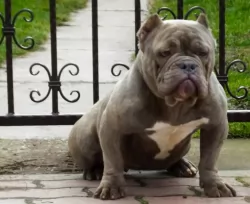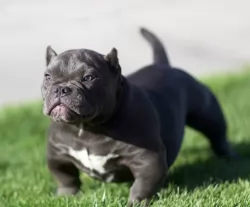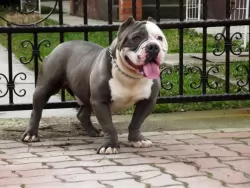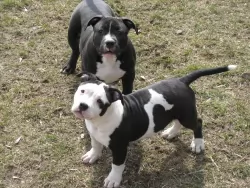 MyDogBreeds
MyDogBreeds Queensland Heeler is originated from Australia but American Bully is originated from United States. Both Queensland Heeler and American Bully are having almost same height. Queensland Heeler may weigh 28 kg / 61 pounds lesser than American Bully. Queensland Heeler may live 3 years more than American Bully. Queensland Heeler may have less litter size than American Bully. Both Queensland Heeler and American Bully requires Low maintenance.
Queensland Heeler is originated from Australia but American Bully is originated from United States. Both Queensland Heeler and American Bully are having almost same height. Queensland Heeler may weigh 28 kg / 61 pounds lesser than American Bully. Queensland Heeler may live 3 years more than American Bully. Queensland Heeler may have less litter size than American Bully. Both Queensland Heeler and American Bully requires Low maintenance.
 Another name for Queensland Heeler is Australian Cattle Dog or Blue Heeler.
Another name for Queensland Heeler is Australian Cattle Dog or Blue Heeler.
These dogs have always been known for herding cattle. The term ‘Heeler’ comes from the dog’s working style – nipping and biting at the cattle’s hooves.
He was was an Australian cattle dog for Australian settlers in the 1800s. It is believed that Thomas Hall created one of the foundations of the Australian Cattle Dog breed by crossing crossing sheepdogs with Dingos.
The Blue-colored dogs have been the most popular, being known as the Blue Heeler.
 The American Bully breed was founded in the United States in the mid of 1990s also recognized by the United Kennel Club on July 15, 2013. They are augmentation from the American Pit Bull Terrier breed. The ultimate goal of creating this breed was the best family companion. They are selective breeding which means the characteristics and their temperament are artificial ones. So they are influenced by several other breeds like English Bulldog and Olde English Bulldog. Even though they are selective breeding, they possess the peculiar temperament is ultimate companion to their owners.
The American Bully breed was founded in the United States in the mid of 1990s also recognized by the United Kennel Club on July 15, 2013. They are augmentation from the American Pit Bull Terrier breed. The ultimate goal of creating this breed was the best family companion. They are selective breeding which means the characteristics and their temperament are artificial ones. So they are influenced by several other breeds like English Bulldog and Olde English Bulldog. Even though they are selective breeding, they possess the peculiar temperament is ultimate companion to their owners.
 The Queensland Heeler is a medium sized dog that stands between 43 and 51cm in height, both male and female. The dog weighs in the region of 15 to 22kg.
The Queensland Heeler is a medium sized dog that stands between 43 and 51cm in height, both male and female. The dog weighs in the region of 15 to 22kg.
He has a short double coat with colors being blue, mottled blue and also red speckled. You’ll also find black and tan coloring on this active dog.
He is strong, lean and muscular with medium sized ears that are erect. The eyes are dark and alert, the legs straight and strong. The tail can be docked or left long.
The Australian Cattle Dog is a high-energy working dog that you won’t easily find lying around. The alert eyes are consistently looking around for action and he can’t be bored otherwise he could resort to digging or other destructive behavior.
He is loving to his entire human family, but being particularly attached to just one family member. He is also protective, taking his guarding role of his family seriously.
He gets on well with children and other pets but you’ve just got to keep your eyes on him around children as when excited he can give a nip or two.
Training and socialization will be important for this dog, particularly because he can be strong-headed, willful and stubborn.
 They have proper muscle tone. They are a good family dog. They are very active and agile because of their head and body proportion are balanced. Even though they are a smooth coat dog, they have a great strength because of their size. The super power of this dog possess tremendous stamina and power. An ultimate are essential for maintain the proper muscle tone and also avoid the gain of overweight. The American Bully dog possesses the intense energy to do well in performance and showcase their talents in the events.
They have proper muscle tone. They are a good family dog. They are very active and agile because of their head and body proportion are balanced. Even though they are a smooth coat dog, they have a great strength because of their size. The super power of this dog possess tremendous stamina and power. An ultimate are essential for maintain the proper muscle tone and also avoid the gain of overweight. The American Bully dog possesses the intense energy to do well in performance and showcase their talents in the events.
There are four kinds of American Bully. Each and every breed has minor difference in their appearance also characteristics. They are,
They have medium and large size compact body than the other varieties. The impression of this dog gives little bit rough and tough. But their behaviour is so gentle and also easily mingle with the people and fellow dogs.
The Classic kind is the inspired American Bully. They are light weight than the other varieties. So they have lighter body and less body mass. They have bones substance only not in buff.
The pocket bully possess the same characteristics and appearance of Standard bully. But the only one difference between both of us is height. The pocket bully is shorter than Standard. Even though it is a pocket bully it does not fit in anyone’s pocket, just for kidding.
Extra Large bully have heavily muscled. So they are very impressive according to the appearance wise. This is also similar to the Bully Standard, they are same in characteristics, temperament and appearance. They are easily weight gaining.
UKC- United Kennel Club
APBT- American Pit Bull Terrier
 Active, intelligent, feisty, brave, playful, loving – these are just some of the wonderful characteristics you get when you bring a Queensland Heeler into your home.
Active, intelligent, feisty, brave, playful, loving – these are just some of the wonderful characteristics you get when you bring a Queensland Heeler into your home.
True, he is independent, self-willed and stubborn, but training and socialization can take away all the rough edges.
He forms a strong bond with his human owner, and once you’ve had one of these amazing dogs in your life, you’ll be convinced that dogs are truly man’s best friend.
 The American Bully is ultimate family companion. They are very loving and gentle with the people and their fellow dogs. They are extremely affectionate with family members.
The American Bully is ultimate family companion. They are very loving and gentle with the people and their fellow dogs. They are extremely affectionate with family members.
This breed is the best companion also obedient to their owners. It is very intelligent because they have a decision caliber. If anyone make harm to their master, it will aggressive and ready to bite those people. This breed possesses the loyalty and amiable.
They are love to play with kids. This breeder have unique character like extreme tolerance with children. Even though it may be calm in nature, you have to frequently monitor while playing kids with dogs.
The breed is versatile and capable of accomplishing a wide variety of tasks. Like Frisbee, swimming, hide and seek and throw ball. If athlete train the dog they are perform and showcase their talents in the events. Even though they are outgoing dogs, they strictly follow their rules instruct by the master. They are obedient and trustworthy.
American Bully will do okay in an apartment living. Even though they live in moderate weather, they prefer warm climates only. They are love to live with people or even fellow dogs.
 Australian Cattle Dogs are healthy. Every dog, even the most healthiest breeds, can succumb to some of the common dog illnesses there are.
Australian Cattle Dogs are healthy. Every dog, even the most healthiest breeds, can succumb to some of the common dog illnesses there are.
This is an inherited condition, so if you’re looking for a puppy, be careful about the breeder you buy from.
This is another inherited condition where the thighbone of the dog doesn't fit properly into the hip joint. Your dog is usually so active but with this problem he may well be in pain and actually be lame. Your pet can even develop arthritis . The idea is to get your pet to the vet because it can be unbearable to see him in pain and unable to get around.
This eye disease can mean deterioration of the retina. You'll recognize the signs when you see your dog unable to navigate around your home during the night. He is night blind but later on he can’t see during the day either.
 Some bully breeders give drugs to their dogs. For the purpose a large muscular body and glossy hair. When the drugs are stopped the dog’s body shrinks back down to a normal size and the hair fall may happen. But it will made many health issues to their dogs, especially it will create organ and joint problems. So better to avoid the usage of drugs.
Some bully breeders give drugs to their dogs. For the purpose a large muscular body and glossy hair. When the drugs are stopped the dog’s body shrinks back down to a normal size and the hair fall may happen. But it will made many health issues to their dogs, especially it will create organ and joint problems. So better to avoid the usage of drugs.
Sometimes drug’s impact can passed from mother to puppy. If you are adopt a puppy in the market be sure you can find a drug free dog. It will be avoid heritage issues also.
If the Bully have Cherry colour eye, are often affecting by the ectropion and entropion disease. It causes the eyelid is turned outwards away from the eyeball.
 To cope with his life on the Australian Outback, the Queensland Heeler is known to be a low maintenance dog.
To cope with his life on the Australian Outback, the Queensland Heeler is known to be a low maintenance dog.
The thick coat does shed and it can get dusty so a good brush twice a week is all that is basically required for this dog. If his nails don’t wear down naturally, you will need to have them trimmed. As with every dog, you will need to give attention to his ears and teeth.
This is an extremely active dog. He is going to be needing both mental and physical stimulation to avoid boredom, after all he is used to an active lifestyle herding cattle. Hikes, swimming, running – you name it – he’ll join you with all your activities.
Your Queensland Heeler is such a vibrant dog, full of the joys of living, and you want to ensure he has good food to eat to ensure he stays like that.
For convenience you get some excellent commercially manufactured dog foods. Your Blue Heeler is such a wonderful companion dog that you want to spoil him a bit and give him some delicious home-made food too. Boiled chicken, brown rice or pasta and spinach, sweet potatoes and carrots are a healthy choice for your pet – plain and simple just like dogs love it. Chop it up and add it into the high quality dry kibble a couple of times a week.
Some raw meat added in from time to time will help his skin and coat remain healthy. Never leave him without a constant source of fresh, cool water.
 This breed is naturally have glossy hair. So we can easily groom it. If we are using the dry shampoo and brush the hair as necessary for improve the hair’s health. After bathe rub with a piece of towel because this breed is average shedder.
This breed is naturally have glossy hair. So we can easily groom it. If we are using the dry shampoo and brush the hair as necessary for improve the hair’s health. After bathe rub with a piece of towel because this breed is average shedder.
Vaccination should be the top priority for pets. It will prevent the dogs from rabies. Keep the health check-ups frequently at least once a year.
The worms can easily affect our breed. But we are not easily found unless bully avoid having the food and also checking bully’s waste matter. De-Worming can be prevent by checked every three months to the veterinarian.
Vitamin supplements can help your bully’s nutritional health. There are a lot of vitamin supplements are available in market, but we recommended choosing the best American Bully supplements. The best food for bully needs quality meats that contains high protein rich and fat.
Keep doing exercise is improve the bully’s physique. They are very interested to chase Frisbee. But swimming and walking will be good for them. They are keen bond with master and their family members also like to play with fellow dogs.